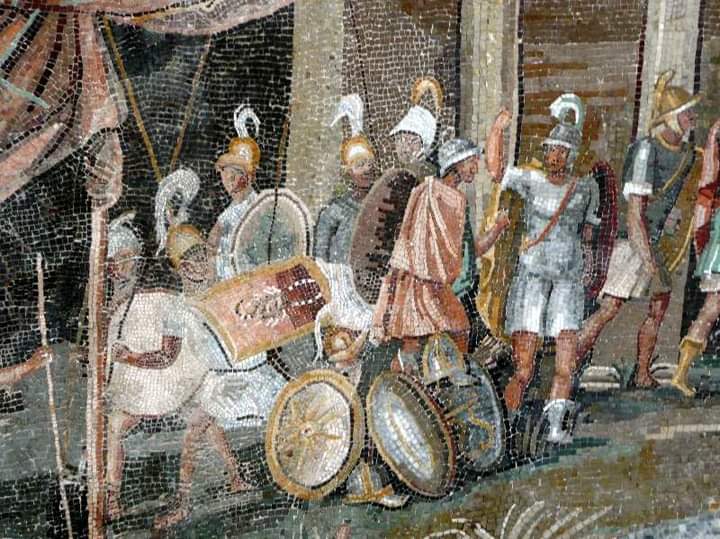By St. Vincentius of Lerin,
from his remarkable historical work “Memorial Book of the Antiquity and Universality of the Congregational Faith”
Chapter 4
But in order to make what we have said clearer, it must be illustrated by separate examples and presented in a little more detail, so that in our pursuit of excessive brevity, the hasty word should take away from the value of things.
In the time of Donatus, from whom the name “Donatists” comes, when a large part of the people in Africa had rushed to the outbreak of their error, when, forgetting name, faith, confession, they had placed the sacrilegious recklessness of one man before the Church of Christ, then, of all throughout Africa, only those who, scorning the foul schism, had joined the universal Church, could preserve themselves unharmed in the sanctuary of the conciliar faith; they indeed left to generations an example, how later prudently to place the health of the whole body before the folly of one, or at most a few. Also, when the Arian poison had infected, not some corner, but almost the whole world, insomuch that a darkness had clouded the minds of almost all the Latin-speaking bishops, led partly by force, partly by deceit, and prevented them from deciding what course to pursue in this confusion – then only he who truly loved and worshiped Christ and placed the ancient faith above the new treachery remained unstained by the contagion that comes from touching him.
The dangers of the time showed more clearly to what extent the introduction of a new dogma could be fatal. Because then not only small things collapsed, but also the most important things. Not only kinships, blood relations, friendships, families, but also cities, peoples, provinces, nations, and finally the entire Roman Empire was shaken and shaken to its foundations. For after this same vile Arian innovation, like some Bellona or fury, had first captured the emperor, and then subjected to the new laws and all the highest people in the palace, it did not cease to mix and confuse everything, private and public, sacred and blasphemous, not to distinguish between good and evil, but to smite whomever he pleases from the height of his position. Then wives were violated, widows insulted, virgins dishonored, monasteries destroyed, clergy persecuted, deacons scourged, priests exiled; prisons, dungeons, and mines were crowded with holy men, most of whom, after being denied access to the cities, cast out and banished, fell upon, ruined, and destroyed by nakedness, hunger, and thirst among deserts, caves, beasts, and rocks. And doesn’t all this happen only because the heavenly teaching is displaced by human superstition, antiquity, which stood on sound foundations, is overthrown by filthy newness, the ancient established ones are insulted, the decrees of the fathers are canceled, the determinations of our forefathers turn to fluff and dust, and the fads of the new vicious curiosity are not kept within the blameless limits of sanctified and uncorrupted antiquity?
Chapter 5
But perhaps we make this up out of hatred for the new and love for the old? Whoever thinks so, let him at least believe the blessed Ambrose, who in his second book to the emperor Gratian, himself lamenting the bitter time, says: “But enough, O God Almighty, we have washed away with our own exile and our own blood the slaughter of confessors, the exiles of priests and the evil of this great wickedness. It is clear enough that those who have defiled the faith cannot be safe.’ And again in the third book of the same work: “Let us observe the precepts of the ancestors and dare not violate with gross recklessness the seals inherited from them. That sealed Book of Prophecy, neither elders, nor powers, nor angels, nor archangels dared to open: Christ alone was reserved the right to first explain it. Who among us would dare to break the seal of the Priestly Book, sealed by the confessors and sanctified by the martyrdom of not one and two? Some were forced to unseal it, but then resealed it, denouncing the fraud; and those who did not dare to desecrate her became confessors and martyrs. How can we deny the faith of those whose victory we proclaim?’ And indeed we proclaim it, O venerable Ambrose! Indeed we proclaim her and, praising her, we marvel at her! Who, then, is so foolish that, although he has no strength to catch up, he does not at least long to follow those whom no power could prevent from defending the faith of the ancestors—neither threats, nor flattery, nor life, nor death, nor palace, no guards, no emperor, no empire, no humans, no demons? Whom, I assert, because they obstinately maintained the religious antiquity, God judged worthy of a great gift: through them to restore fallen churches, to revive spirit-dead nations, to lay cast-off crowns back on the heads of priests, to blot out those pernicious unscriptures , and the stain of the new impiety with a stream of tears of the faithful poured out on the bishops from above, and finally to regain almost the whole world, swept away by the terrible storm of this unexpected heresy, from the new unbelief to the ancient faith, from the new madness to the ancient prudence, from the new blindness to the ancient light. But in all this almost divine virtue of the confessors, one thing is most important for us: that then, in the time of the ancient Church, they took it upon themselves to protect not some part, but the whole. For it was not fitting for so great and illustrious men to support with so great an effort the uncertain and often mutually contradictory suspicions of one or two or three, nor to enter into battles for the sake of some casual agreement in some province; but, following the decrees and determinations of all the priests of the holy Church, inheritors of the apostolic and conciliar truth, they preferred to betray themselves, but not the ancient universal faith. That is why they deserved such great fame – to be considered not only confessors, but first among confessors by right and by merit.
Chapter 6
Great, then, is the example of these blessed men, undoubtedly divine, and worthy of remembrance and untiring reflection on the part of every true Christian; for they, like a seven-candlestick, shining sevenfold with the light of the Holy Spirit, set before the eyes of posterity the brightest rule, how later, amidst the delusions of various idle words, they were to clash the audacity of impious innovation with the authority of sanctified antiquity. But this is not new. Because in the Church it has always been the case that the more religious a person is, the more ready he is to oppose innovations. There are countless such examples. But in order not to get carried away, let us take only one, and he should preferably be from the apostolic see; because everyone can see more clearly with what force, with what aspiration and with what zeal the blessed followers of the blessed apostles invariably defended the unity of the faith once achieved. Once the venerable Agrippinus, bishop of Carthage, was the first who, contrary to the divine canon, contrary to the rule of the universal Church, contrary to the opinions of all his fellow priests, contrary to the custom and establishment of the ancestors, thought that Baptism should be repeated. This innovation entailed so much evil that it not only gave all heretics an example of sacrilege, but also misled some of the faithful. And since the people everywhere murmured against this innovation, and all the priests everywhere opposed it, each according to the degree of his zeal, then the blessed Pope Stephen, prelate of the apostolic throne, opposed it together with his companions, but most zealously of all, thinking, in my opinion, that he ought to surpass all others in his devotion in the faith as much as he excels them in the authority of his office. And finally, in an Epistle to Africa, he affirmed the following: “Nothing is subject to renewal – only the Tradition must be respected.” This holy and prudent man understood that true piety admits of no other rule than that everything should be handed down to the sons with the same faith with which it was received from the fathers; that we should not lead the faith according to our whims, but on the contrary – to follow it where it leads us; and that it is proper to Christian modesty and austerity not to pass on what is his to posterity, but to preserve what he has received from his ancestors. What then was the way out of this whole problem? What, indeed, but the usual and the familiar? Namely: the old was preserved, and the new was shamefully rejected.
But perhaps it was then that his innovation lacked patronage? On the contrary, he had on his side such talents, such rivers of eloquence, such adherents, such plausibility, such prophecies of the Scriptures (interpreted, of course, in a new and wicked way) that, in my opinion, the whole conspiracy could not have collapsed in any other way reason, except one – the vaunted innovation has not stood up to the weight of its own cause, which it has undertaken and defended. What happened next? What were the consequences of this African Council or decree? By God’s will, none; everything was destroyed, rejected, trampled like a dream, like a fairy tale, like a fiction. And, oh, wonderful twist! The authors of this teaching are considered faithful, and its followers heretics; the teachers are acquitted, the students are condemned; the authors of the books will be the sons of the Kingdom of God, and their defenders will be swallowed up by hell fire. So who is the fool who will doubt that that luminary among all bishops and martyrs – Cyprian, together with his companions, will reign with Christ? Or, on the contrary, who is capable of this great sacrilege to deny that the Donatists and other pernicious men, who boast that they have been re-baptized on the authority of that council, will burn in eternal fire with the devil?
Chapter 7
It seems to me that this judgment has been made known from above mostly because of the deceitfulness of those who, thinking to cover up some heresy under a foreign name, usually seize upon the writings of some ancient author, not very clear, which by reason of their obscurity correspond to ujkim of their teaching; so that when they put this thing out somewhere, they don’t seem to be the first or the only ones. This treachery of theirs, in my opinion, is doubly hateful: first, because they are not afraid to offer others to drink of the poison of heresy, and secondly, because with an impious hand they stir up the memory of some holy man, as if they were rekindling coals that had already become ashes, and that which should be buried in silence, they make known anew, bringing it to light again, thus becoming followers of their progenitor Ham, who not only did not cover the nakedness of the venerable Noah, but showed it to others, to laugh at him. Therefore he earned a displeasure for insulting filial piety—so great that even his descendants were bound by the curse of his sins; he was not in the least like his blessed brethren, who would not have the nakedness of their venerable father defile their own eyes, nor reveal it to others, but turning their eyes away, as it is written, covered him: they neither approved, nor did they make known the transgression of the holy man, and therefore were rewarded with a blessing for them and their posterity.
But let’s get back to our topic. Wherefore we ought to be filled with great fear and terror of the crime of changing the faith and profaning piety; not only the teaching about the structure of the Church, but also the categorical opinion of the apostles with their authority prevents us from this. Because everyone knows how strictly, how harshly, how fiercely the blessed apostle Paul attacks some who, with astonishing ease, too quickly passed from the one who “called them to the grace of Christ, to another gospel, not that there is another,” “who, led by their lusts, have gathered to themselves teachers, having turned away their ears from the truth, and have turned to fables,” who “come under condemnation, because they have rejected their first promise,” the same are deceived by those of whom the apostle wrote to the brethren in Rome: “I beseech you, brethren, beware of those who produce divisions and seductions contrary to the doctrine which you have learned, and beware of them. Because such serve not our Lord Jesus Christ, but their bellies, and with sweet and flattering words they deceive the hearts of the simple-minded”, “who creep into houses and seduce wives, burdened with sins and possessed by various lusts, wives who always are learning and can never come to the knowledge of the truth,” “blabbermouths and deceivers, … they spoil whole houses by teaching what they ought not for the sake of vile gain,” “men of perverse minds, rejected of the faith” , “overshadowed by pride, they know nothing and are sick of idle debates and arguments; they think that piety serves for gain,” “being unemployed, they are wont to go from house to house; and not only are they idle, but they are talkative, curious, and speak what is unbecoming,” “who, rejecting a good conscience, are shipwrecked in the faith,” “whose filthy vanities will pile up to more wickedness, and their speech will spreads like a dwelling’. It is also written about them: “But they will not succeed anymore, because their folly will be revealed to everyone, just as their folly was revealed.”
Chapter 8
And so, when some such, traveling through the provinces and cities, and carrying around their delusions, like merchandise, reached as far as the Galatians; and when, after hearing them, the Galatians got a kind of nausea from the truth and threw up the manna of the apostolic and council teaching, and began to enjoy the impurities of the heretical innovation, the authority of the apostolic authority manifested itself, to decree with supreme severity: ” But if even we, says the apostle, or an angel from heaven preached to you something other than what we preached to you, let him be anathema.” Why does he say “but if even we” and not “but if even I”? This means: “even Peter, even Andrew, even John, finally even the whole apostolic choir should preach to you something other than what we have already preached to you, let him be anathema.” Terrible cruelty, not to spare either yourself or the rest of your fellow-apostles, so that the soundness of the original faith could be established! However, this is not all: “Even if an angel from heaven, he says, should preach to you something other than what we preached to you, let him be anathema.” For the preservation of the faith once delivered, it was not enough to mention the human nature alone, but the superior angelic nature had to be included. “Not even we, he says, or an angel from heaven.” Not because the holy angels of heaven are still capable of sinning, but because he wants to say: even if the impossible were to happen – anyone, anyone, should try to change the faith once delivered to us – anathema be. But perhaps he said this thoughtlessly, rather poured it out, carried by human impulse, than decreed it, guided by divine reason? Absolutely not. For there follow words filled with the enormous weight of the repeated statement: “As we have already said, now I say it again: if anyone preaches anything to you other than what you have received, let him be anathema.” He didn’t say “if anyone tells you something different from what you have accepted, let him be blessed, praised, accepted”, but he said: let him be anathema, i.e. removed, excommunicated, excluded, lest the terrible contagion of a sheep to pollute Christ’s flock of innocents by her poisonous mixing with him.
Note: On May 24, the Church celebrates the memory of St. Vincent of Lerin (5th century)














